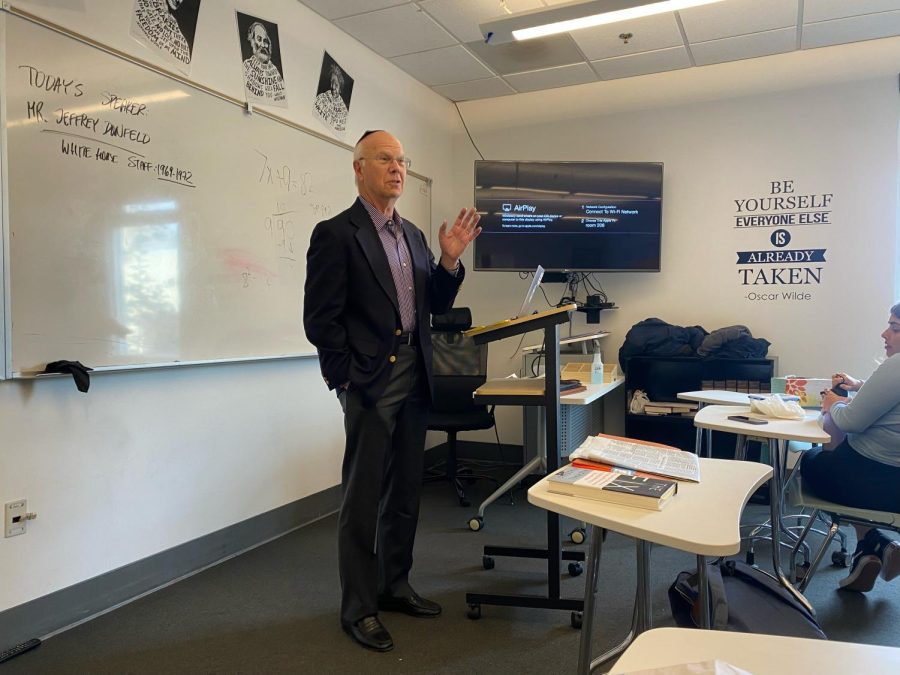INSIGHT: Life lessons and perspective on a career in politics were imparted to Mr. Lieb’s Pharmacology class by former White House official Mr. Jeffrey Donfeld, above.
Drug policy chief from Nixon years has advice for today
Former White House adviser Jeffrey Donfeld spoke to senior Pharmacology class
April 26, 2023
The senior Pharmacology class learned from one of the people in charge of the United States’ drug policy at the time about efforts in the early 1970s to fight drug addiction with another drug instead of charging users with a crime.
Mr. Jeffrey Donfeld, who worked at the White House during the Nixon administration in the 1970s, was in charge of drug policy at that time and spoke on Feb. 16 to a class of Science Department Chair Mr. Pavel Lieb, who is Mr. Donfeld’s son-in-law.
Drug users, including many veterans of the Vietnam War, were at that time most likely to be addicted to heroin, and methadone was an effective treatment, he said.
“I would go around communities, especially minority communities, advocating for the use of methadone,” said Mr. Donfeld as 10 seniors listened intently. “The purpose of putting people on methadone who are already addicted to heroin is to give them a life where they could have a job.”
Mr. Donfeld also presented advice, stories and political anecdotes from his tenure in the Nixon administration. But his primary topic was his work to decriminalize drug addiction among veterans.
He explained that Vietnam veterans returning to the U.S. were addicted to various drugs. He himself advocated for creating diversion programs to not incarcerate heroin addicts, but to help them. Mr. Donfeld helped introduce the idea of employing methadone as a treatment for heroin addiction to the Nixon administration, he said.
Methadone treats people addicted to opioids by reducing craving and withdrawal symptoms. However, methadone is a controversial treatment because some view it as just replacing one narcotic with another, since it is addicting itself, though safer to rely on than other opioids.
It also has multiple harmful side effects, he said, including slow breathing, restlessness and many withdrawal symptoms, including nausea, fever and sweating.
In Pharmacology, seniors are studying legal drug manufacturing and distribution, so Mr. Lieb said he felt Mr. Donfeld’s expertise and experience applied to their learning.
“What was really interesting,” Mr. Lieb said, “is to just see how rational the approach to dealing with drug addiction was during that time…and how the general direction was to treat and to help as opposed to criminalize.”
Back in 1969, as Staff Assistant to President Nixon in the White House, Mr. Donfeld co-wrote legislation that created the Special Action Office for Drug Abuse Prevention (SAODAP). In the early 1970s, he initiated a system of methadone clinics to treat drug addiction.
According to the National Library of Medicine, in the mid-to-late 1960s, treating drug addiction shifted from the incarceration of substance abusers in the 1920s – 60s to using methadone and “therapeutic communities” – residential treatments.
While Mr. Donfeld’s work was focused on treatment rather than incarceration for drug users, then-President Nixon initiated mandatory prison sentencing for drug crimes in the early 1970s, which began what became known as the “war on drugs.”
Today, around 65% of all incarcerations are due to substance use disorders, according to the National Institute on Drug Abuse. The mortality rate due to drug overdoses has increased every year since the 1970s, except for 2018.
But recently, a new treatment option for opioid overdose has been introduced: naloxone, a medication that can be used in emergencies to reverse an opioid overdose.
In California, a new naloxone policy has distributed 2.3 million doses of the antidote and reversed 145,000 overdoses since the program was started in 2018, according to the state’s Naloxone Distribution Project.
Mr. Donfeld also spoke to the class about the Watergate scandal of 1972, and allegations of antisemitism made against then-President Nixon.
A series of tapes published in 1971 contained then-President Nixon’s conversations, in which the former president was heard saying negative things about Jews in the anti-Communist investigations that occurred during his administration, and about a Jewish judge and the then-White House Defense Department analyst who had Jewish roots.
Mr. Donfeld said he believes the best way to discredit those accusations is to consider what Nixon did for Israel during the Yom Kippur War, when the U.S. supplied Israel with weapons at the Israeli government’s request. Mr. Donfeld described how he himself “sat on the beach in Tel Aviv and watched the American planes fly over the Mediterranean,” he said.
Watergate was different though, he said. Mr. Donfeld said President Nixon didn’t need any information from the Watergate break-in because he was already ahead in the polls.
“It was a mistake,” Mr. Donfeld said.
Mr. Donfeld told the class that he lost respect for Nixon after the scandal, because Nixon had tried to cover up what had happened.
“If the cover-up had not occurred, the world might be very different if Richard Nixon got to serve another four years,” Mr. Donfeld said.
Senior Yael Schechter appreciated the point of view that Mr. Donfeld offered about how the Nixon administration handled drug addiction both in the U.S. and in Vietnam with American soldiers.
“From an outsider’s perspective a lot of people disagree with it,” said Yael. “They think about minorities that were affected by it.”
Mr. Lieb felt that Mr. Donfeld’s life experience made a natural connection to the Pharmacology class.
“He feels very strongly about supporting the Jewish community and sharing his life and experience,” Mr. Lieb said in an interview after the class. “There’s a lot of valuable lessons in it.”
After his work in the White House, Mr. Donfeld worked for three law firms before creating his own firm with two others in 1985. He is currently a practicing lawyer in Los Angeles, at his firm Donfeld and Rollman.
